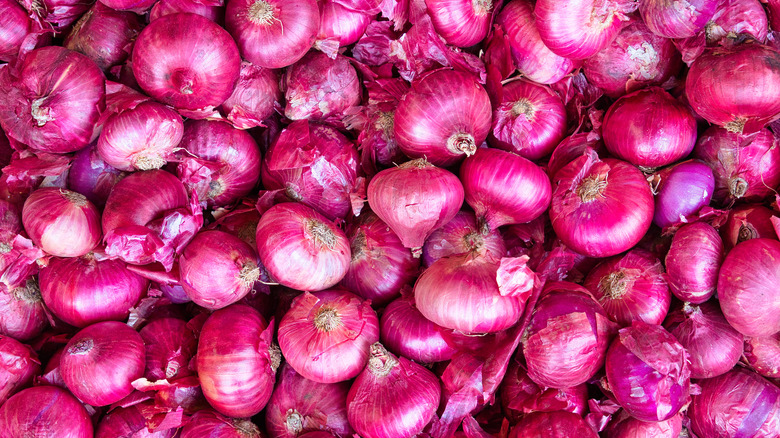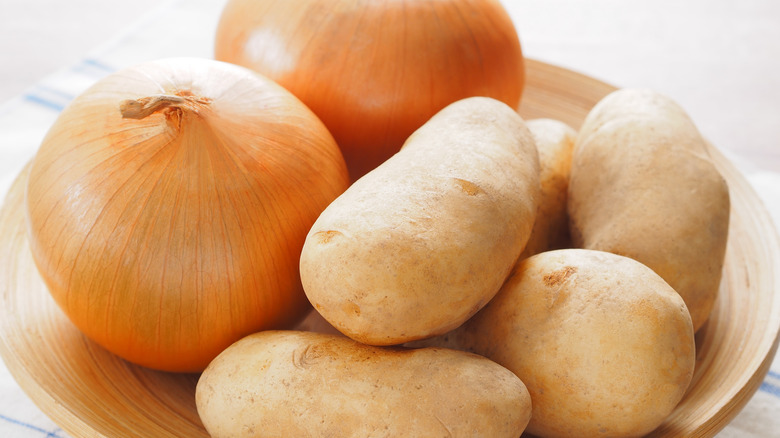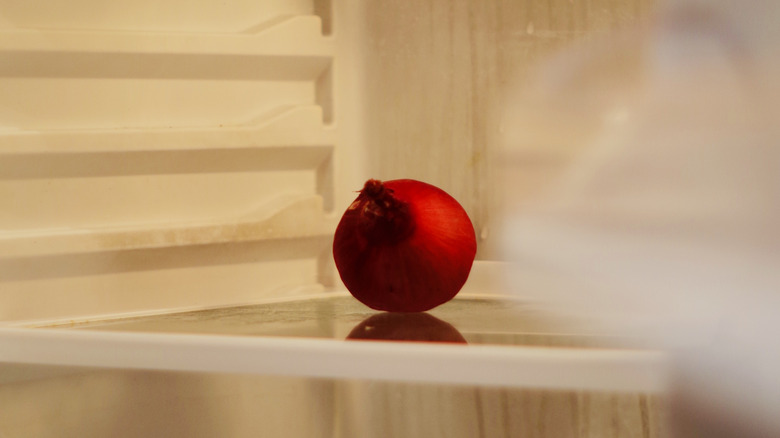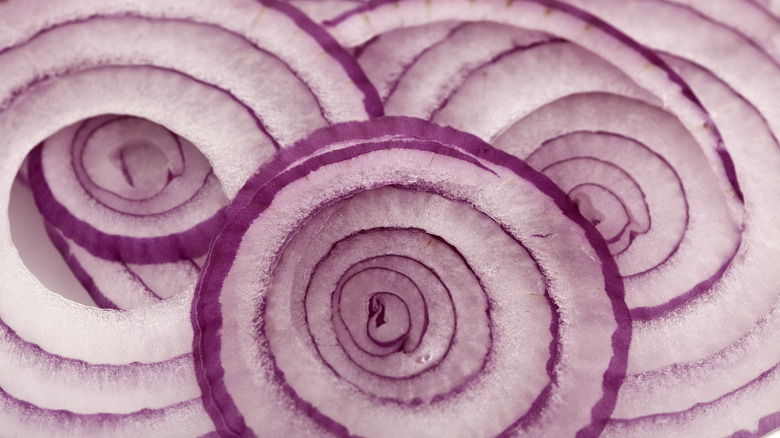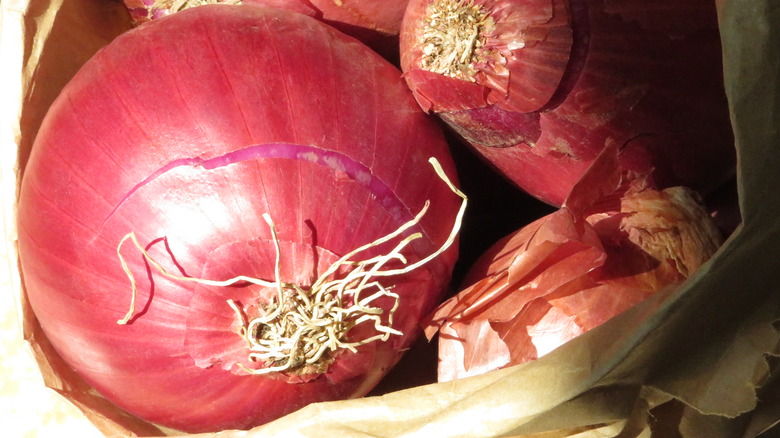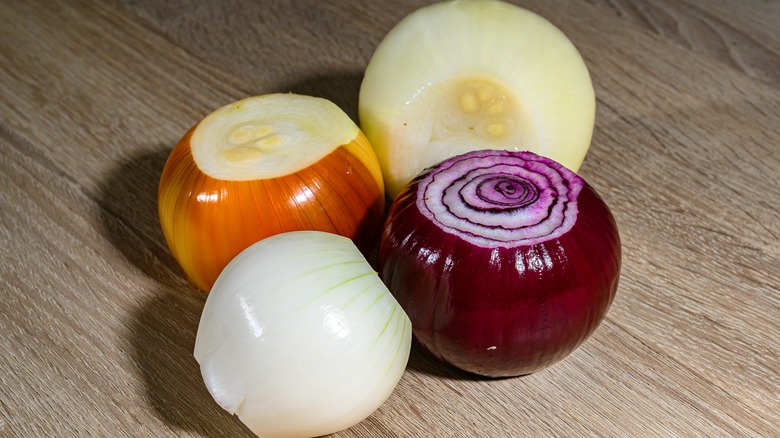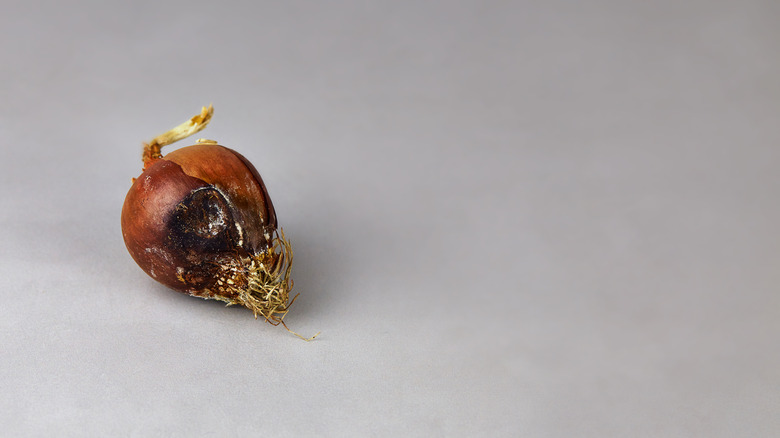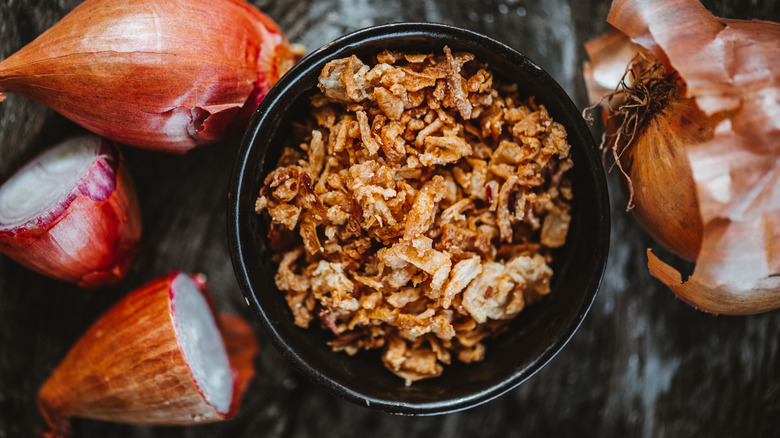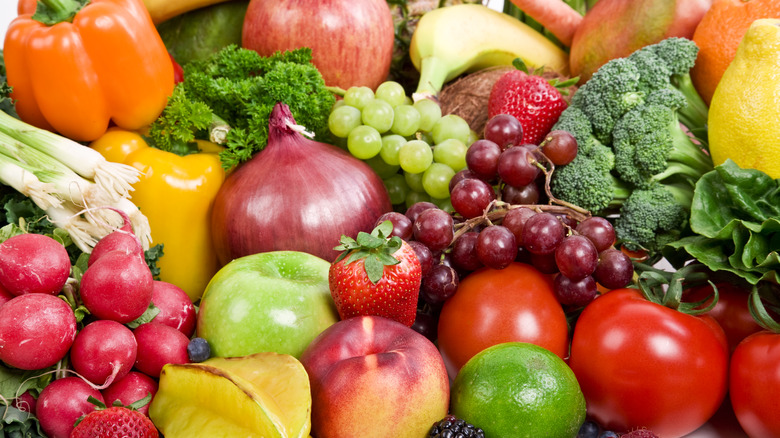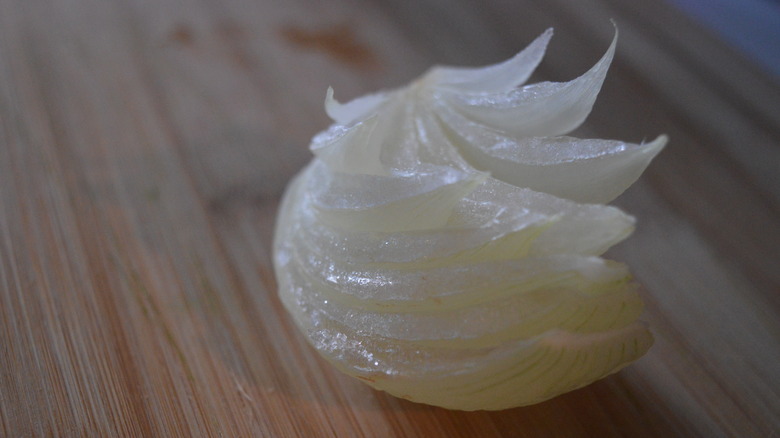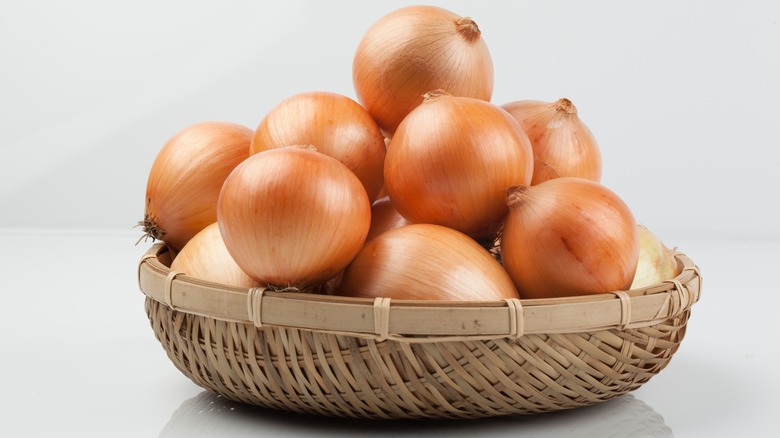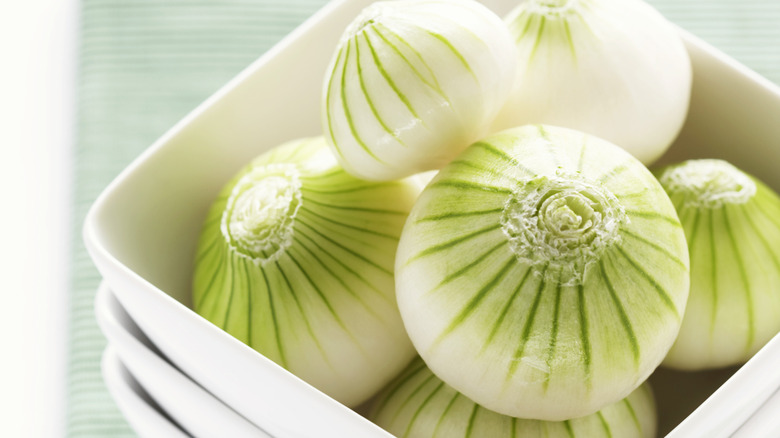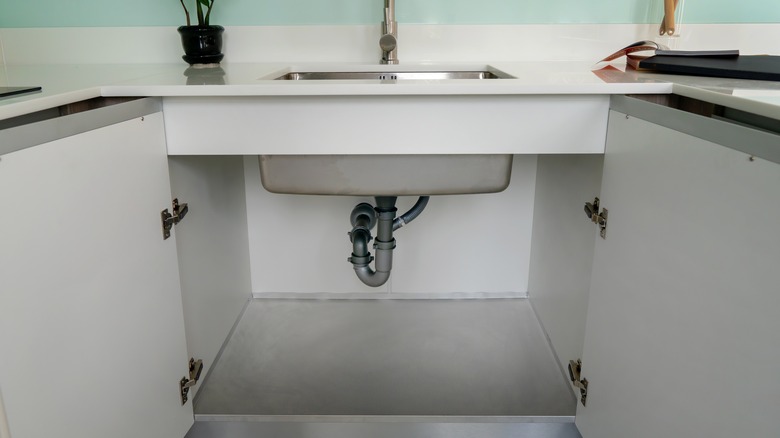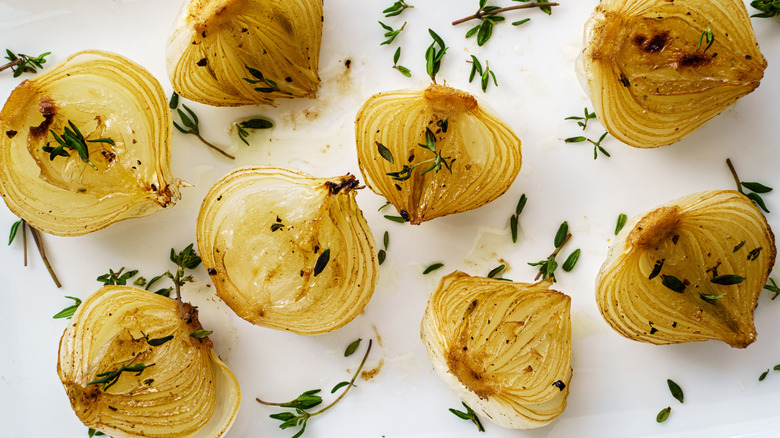Mistakes You Might Be Making When Storing Onions
For as long as there have been recipes, there have been onions to go into them. These vegetables have been around since prehistoric times, and were a key staple in ancient diets way before the invention of writing or farming. Over the years, the onion (which is believed to have first grown in either Central or South Asia, with other archeologists citing Iran as their place of origin) has taken a central place in diets around the world and has had cultural and practical importance to multiple different civilizations. In Ancient Egypt, for example, onions were worshipped and used as part of the mummification process, whereas, in Ancient Greece and India, they were used as medicine.
Nowadays, though, most of us know onions as the first thing you have to chop up and fry in a limitless number of recipes. Onions provide a base savory note to food that's difficult to replicate, and whether you're using red, white, yellow, or green onions, they're a vital part of many dishes. But despite the fact that these vegetables have been around for countless years, many still haven't quite learned how to store them. Onions have a knack for getting soggy or moldy fast, and that's largely due to where and how we keep them in the kitchen.
Putting them next to your potatoes
Many people have a designated space for their bulkier root vegetables, and it's fairly common for onions and potatoes to be stored in the same drawer. But unless you want your potatoes to be more work, you should keep the two separate. As your onions sit in your drawer, they're constantly releasing ethylene gas. This gas can encourage potatoes to start sprouting, changing them from a smooth, fleshy tuber to a vegetable that's suddenly covered in shoots.
Importantly, sprouted potatoes aren't harmful to eat, and once you remove the sprouts, you can eat them as you normally would. But it might not taste the same as it once did. Alongside the sprouting effect of the gas, onions can also impart their strong taste onto potatoes, being absorbed into their flesh. The same thing can happen if you store potatoes with garlic, which is part of the allium family onions belong to.
And all of these things can have a negative effect on your onions, too. As the potatoes are infiltrated by the ethylene gas and sprout, they can also start to rot. And once this happens, your onions can start to suffer, too, aging and rotting until all of your vegetables are ruined. The best thing to do is to store the two things separately.
Placing them in the fridge
It can make sense to think that storing onions in the fridge is a good idea. When you place food in your refrigerator at a cold temperature, any bacterial growth can be slowed down or halted, preserving your food for far longer than if you kept it at room temperature. But some foods don't belong in the refrigerator, onions being one of them. The reason why onions come with hard, crispy skin on their outer layer is that once they're harvested, they're cured, being left in a well-ventilated area so that their exterior dries out.
This drying process protects the onion — but by putting it in the fridge, you're placing it in a humid environment. As the onion then absorbs the moisture in the cold fridge air, it can get moist and spoil. Instead, try to keep them in a dry environment, like a pantry or drawer.
Remember that this rule doesn't apply if your onions have already been chopped. While chopped onions may not necessarily spoil immediately at room temperature, thanks to their acidity preventing microbe growth, they may not be at their freshest if left out. Cut onions can be pretty pungent, too, and leaving them on the counter may stink up your kitchen.
Storing them once they've already been sliced
It's helpful to get ahead in the kitchen, and as chopping an onion is a fairly annoying, laborious task at the start of every recipe, you might be cutting yours hours in advance. But we recommend that you hold off doing so. When an onion is sliced, an enzyme called alliinase is released, a substance that's also found in other allium plants like garlic. Onions also contain amino acids, which the alliinase starts to mix with, and when the two do, they release the oniony smell we all know so well.
The problem, though, is that the longer the alliinase and the amino acids have to mix, the more pungent the onion smell and taste get. And while it might be pleasingly savory and sharp after you've just sliced into it, after a while, things can get acrid and unpleasant. This will not only ruin your meal, but it might also cause your fridge to take on gross onion odors that become difficult to get rid of.
There are times, however, when it might be preferable to prepare your onions in advance. If that's the case, make sure you're storing them in an airtight container in your fridge, and use them as soon as possible.
Keeping onions in a grocery bag
It might seem easy to toss your onions directly into your drawer without removing them from the produce bag first, but doing so can spoil your onions quickly. The reason why is that onions need to stay dry to keep, and that requires air to be able to move around them. Keeping whole onions in the bag you brought them home in reduces their shelf life because moisture gets trapped inside. This encourages microbes like mold to grow, sometimes rendering your onion unusable.
Too much moisture can also cause the onions to essentially keep growing. Onions are root vegetables and have a natural inclination to sprout new parts, and they'll do just that when there's water around. And while sprouted onions are still safe to eat, they may have a bitter taste. It's best to take your onions out of the bag when you get them home. Transferring them to a mesh bag can also be a useful thing to do, as these will allow air through them.
Treating all onions equally
Onions come in many shapes, sizes, and colors, and each of them supplies a unique quality to your meal. Classic red and white onions can give a boisterous savoriness, whereas green onions and chives provide a more delicate taste and verdant, bright tones.
And just as these onions should be cooked differently, they should also be stored differently. Yellow, white, and red onion can all be treated in the same way when it comes to storage, placed in a well-ventilated, dark, dry place. If they're kept correctly, they're usually fine to eat for a month or so, although they can last for much longer. Shallots last the same length of time, and should be stored in the same way — the easiest thing to do is to keep them with your other onions.
Where things start to look slightly different is with green onions and chives. Green onions need to be refrigerated to prevent wilting. Storing them in the moist air of a fridge keeps them firm, with chives needing a similar environment to stay their best. To keep green onions at their freshest, you can pop them in a jar, add water to cover their roots, and place a plastic bag over the top to trap the moisture.
Storing onions for too long
The curing that onions go through after being picked helps them stay usable for a while after you bring them home — and they can last for a surprisingly long time. Properly stored onions can last anywhere from three to six months.
However, they won't stay fresh forever, and once they're started to rot, you should throw them out. The first thing to look for is moisture in any part of the onion. This will usually affect one or more of its layers, turning the firm flesh squishy. Onions can also go bad in localized spots, with small parts of them becoming wet and soft. If the rest of your onion seems unaffected, it may be okay to slice these parts off and use the rest. If you notice a pungent, rotten odor, though, we would advise getting rid of the whole thing and using a fresh one.
Putting your crispy fried onions in the wrong container
Crispy fried onions might be the ultimate topping, going well with a variety of savory foods and delivering a serious savory crunch. But that crunch will only be present if you're storing them correctly. The key to storing crispy onions is to keep them as dry as possible. If you don't, and moisture is allowed to penetrate them, they'll go limp and lose their appeal.
Once you've made them, transfer your crispy fried onions to a Ziploc bag or an airtight container, ensuring that they're completely cool before you do so. If you put them in their container while still warm, the condensation that's released will just work its way back into the onions. You can then keep them in the fridge for up to a week. For longer-term storage, you can place them in the freezer for up to four months, and they may last for even longer. Just bear in mind that the longer you keep them, the more likely they are to lose their flavor and texture and develop freezer burn. You should also remember that if you're opening and closing the container they're in too often, you increase the chance of moisture getting in and ruining them.
Storing sliced onions next to certain fruits
It can make sense to keep all of your fresh produce in one place, but onions and fruit should be kept well apart. This is especially true if you've already sliced your onions, which causes them to release their strong scent. Celery, pears, and apples are the most likely fruits to absorb that unmistakable onion smell. This doesn't necessarily happen if your onions are still uncut and unpeeled, so if you must keep them together, make sure they're sealed.
Crucially, too, keeping these items together might not just cause your fruit to suffer, but your onions too. The scent of certain fruits, like apples, can work its way into your onion layers, causing your allium to taste a little different. Apple scents can also permeate other fruit and vegetables, like figs, cabbages, and carrots. It's best to store onions separately from your fruit when possible.
Freezing onions whole
Onions are surprisingly robust when in your freezer, and unlike other vegetables — which need blanching beforehand — they can be frozen raw. Importantly, though, they should always be sliced before being frozen. While you can technically freeze whole onions, the whole point of using frozen fruit and vegetables is that it makes it more convenient to pull out and use whenever you need. Frozen whole onions, however, are bulky, and they will need full defrosting before you can prepare them — and as onions tend to last several months when stored properly at room temperature, there's really no need to.
So, if you're freezing your onions, make sure you chop them first before transferring them to a freezer bag. It can be useful to bag them in individual portions, as once they start to freeze, they'll clump together. To counteract this, you can freeze the pieces individually, by laying them on a lined sheet pan and placing them in the freezer for an hour, before decanting them into a plastic bag or container. Frozen onions will last for approximately eight months in the freezer before they lose their quality, but the earlier you eat them, the better they'll be.
Keeping them in a sunny spot
Onions might need adequate amounts of sun and warmth to grow, but once they reach your kitchen, you should keep them in the shade. Direct sunlight can ruin your onions fast, as they can cause them to warm up, increasing the rate at which they go bad. With this warmth can also come an increased amount of water vapor in the atmosphere of your kitchen, and more humidity, which again may cause your onions to go mushy.
As such, try to keep your onions as cool as possible, particularly during the summer months. Remember that this starts from the moment you pick them up from the store. Once you get them home, place them in the coolest part of your house. Your basement can be a great option here, as depending on where you live, it can stay cool and dark year-round. Garages are also useful locations to keep onions.
Leaving your peeled onions out in the open
If you're not ready to chop up your onion but still want to do a little bit of preparation, then peeling them can be a good middle ground. But once you've removed the top layer of skin, it's a good idea to pop them in your refrigerator. The lower temperature of your fridge can reduce bacterial action, helping your peeled onions to last longer.
Placing the onion in an airtight container is also important, as while peeled onions won't release as much odor as chopped ones, they'll still give off a strong scent. Try wrapping them in some plastic wrap or placing them in a Ziploc bag to stop them from mingling with the other items in your fridge. Once peeled, an onion will usually last for a few weeks in the fridge, provided that you're keeping them at a constant temperature and not exposing them to too much humid fridge air.
Storing your onions under the sink
As a dark, easy-to-reach spot in your kitchen, we understand why you'd think putting onions under your sink would be a good idea. But as an environment that's in close proximity to constant running water, it might not be the best place to put them. The area under the sink can get super humid, due to there being multiple pipes that can build up condensation. This can be a particular problem if your pipes aren't insulated properly.
The bottom of your sink, too, can become wet from condensation. And all of this is a nightmare for onions, which deteriorate rapidly in moist conditions, sprouting or rotting much faster than if they're kept dry. The area under the sink is one of the areas in the home that's most prone to leaks, thanks to the presence of water-bearing pipes and shut-off valves, again creating issues for your onions. As some of those pipes carry hot water through them, it's also a place that can get surprisingly warm, which onions definitely don't like. And, to top it all off, there's barely any ventilation down there.
Leaving cooked onions out in the open
If you have leftover cooked onions, the first thing to bear in mind is that they'll lose their quality far quicker than the raw ones will. You generally have between three to five days before they're past their prime, so make sure you eat them up quickly. This rough timespan, however, is only applicable if you're keeping them in the fridge. If you're storing them at room temperature, not only will they go bad faster, but they'll also quickly become the prime location for bacteria to grow.
Raw onions have antimicrobial qualities which help to limit the growth of bacteria. Once they're cooked, however, the compounds that keep microbes at bay are reduced. Escherichia coli, or E. coli, can produce diarrhea, nausea, vomiting, and stomach cramps, according to Mayo Clinic. And Clostridium botulinum is especially dangerous, producing toxins that, in a worst-case scenario, may result in paralysis and death, says the World Health Organization.
